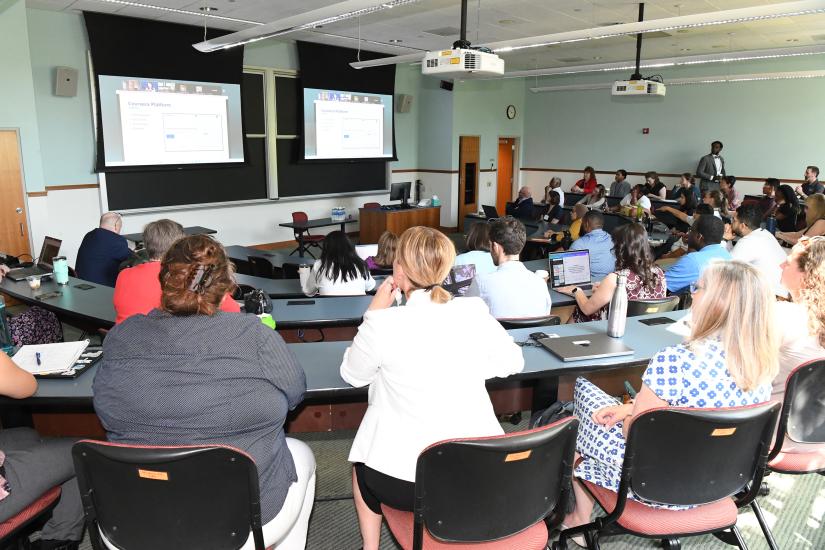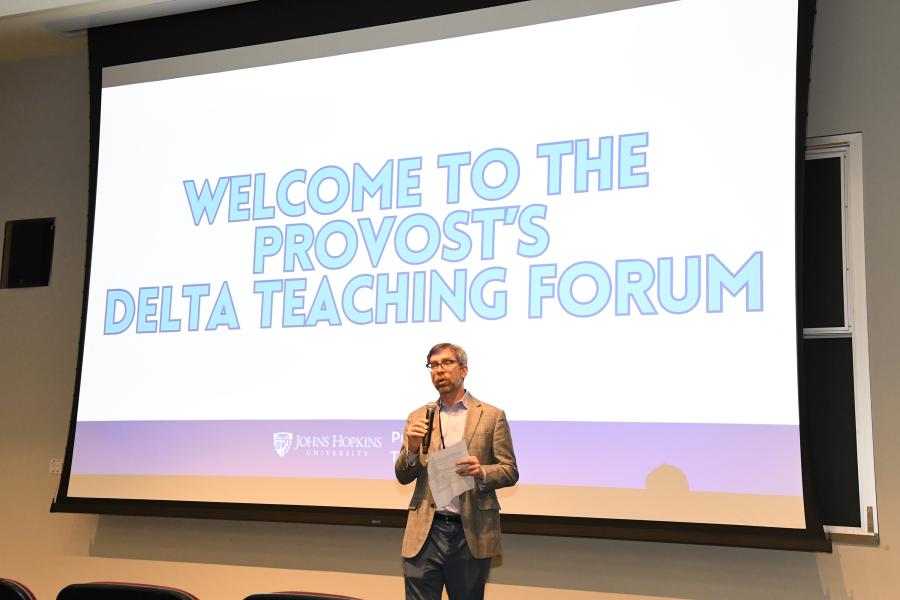The Office of the Provost hosted its 6th annual Digital Education and Learning Technology Acceleration (DELTA) Teaching Forum on May 2, bringing the Johns Hopkins community together to discuss best practices and innovations in university teaching.
"We all recognize that teaching is a core part of our mission," said Executive Vice Provost Stephen Gange, who opened the event. "Your presence here today shows your commitment to student learning and your own professional development."
Added Provost Ray Jayawardhana: "The moments when our assumptions and preconceived notions are challenged is when new paths to discovery emerge ... [Today] is a testament to your devotion to reaching the hearts and minds of our students in meaningful and impactful ways."
Attended by nearly 300 people either in-person or online, the forum began with a keynote speech from Arthur Levine, President Emeritus of Columbia University's Teachers College and author of The Great Upheaval: Higher Education's Past, Present, and Uncertain Future.
"Johns Hopkins is a historically important institution," Levine said. "I used to teach a course on the history of higher education and I always had one or two sessions on the founding of Johns Hopkins: America's first research university."
According to Levine, changes in technology, demographics, and the economy are putting new pressures on higher education. Factors such as artificial intelligence and online certificates are creating new demands, and for universities to flourish, they need to evolve.
Image caption: Arthur Levine
Image credit: Jim Burger for Johns Hopkins University
"I'm really happy to have an opportunity to talk with you, this audience, because you're the people who are going to reshape higher education for the 21st century," Levine said. "In the Industrial Revolution, Johns Hopkins was a model. We need you to do it again. I can't think of an institution better poised to lead the current transformation. That's not some idle compliment I'm offering. It's not something I say at every university I visit. Johns Hopkins has the vision, the history, the resources, the reputation, the research infrastructure, the cutting-edge experimentation, and deep concern with undergraduate education. .... You have the ability this time to reinvent undergraduate education for a global digital knowledge society. I know it's a daunting task, but no university is better equipped to accomplish it than the Johns Hopkins. So I urge you, please, please embrace that challenge."
The forum included a wide array of learning sessions, with topics including student well-being, leveraging artificial intelligence in the classroom, and experiential learning. Artists from the Peabody Conservatory collaborated to present the pre-lunch plenary session featuring students from the BFA Dance Program of the work Ama combining dance, hip-hop, and guitar led by Zane Forshee, classical guitarist, professor, and chair of professional studies; danah bella , professor and chair of the Dance BFA; and Wendel Patrick, associate professor in music engineering and technology and professional studies. The performance served as the catalyst for a discussion of the values, challenges, and potential for creative impacts reached through multidisciplinary collaboration.
Recordings of the sessions will be posted in the coming weeks on the conference website, https://ctei.jhu.edu/provost-delta/2024. The day's closing keynote was given by Nicole King, an American studies professor at the University of Maryland Baltimore County. During her talk, she explained how Baltimore universities can serve their communities in mutually beneficial ways.
Last year's DELTA award recipients also presented their work at the forum, showcasing the ways that Johns Hopkins University is innovating higher education. The DELTA awards are given out annually to JHU researchers seeking to pioneer new methods of digital and technology-based learning. 2023's winners focused on the themes of artificial intelligence, online learning, and research-based active learning.
Proposals for the 2024 DELTA awards are due by May 31. Up to five proposals will be selected, each receiving a grant of up to $75,000.

Image credit: Jim Burger for Johns Hopkins University
Posted in University News
Tagged higher education









